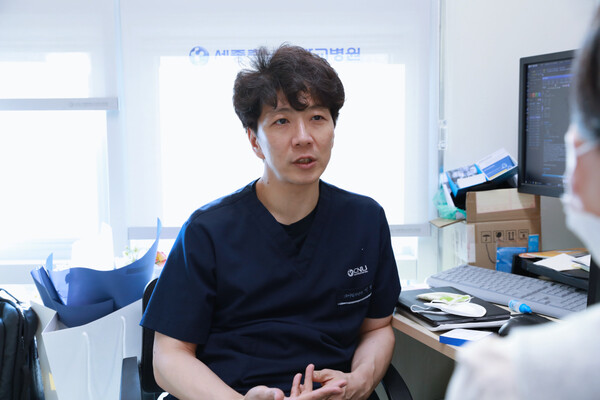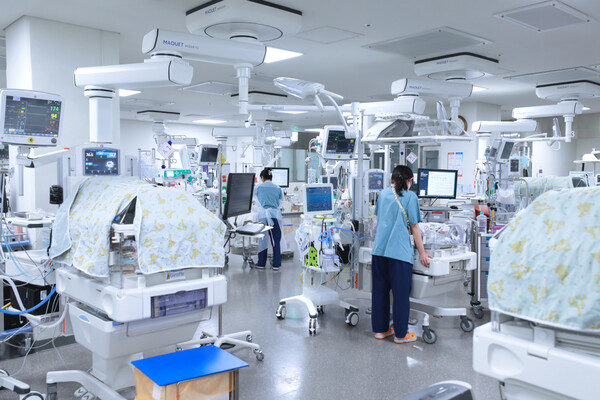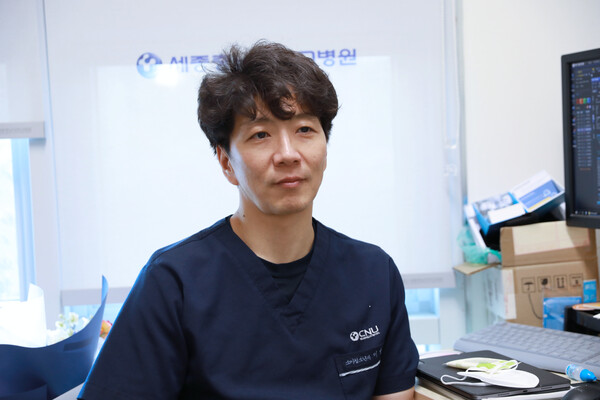
"My wife once asked me what I would do if today were the last day on Earth. I replied, ‘You can come here (to the hospital). Let’s stay here together.' She said she knew it."
Professor Lee Byung-kook sat in the waiting room for physicians with a smile. This is the Neonatal Intensive Care Unit in the main building of Chungnam National University Sejong Hospital. As the head of the NICU, Professor Lee has never left here. He is on call 365 days a year. Since this hospital opened in July 2020, Lee has taken only five days off – for his honeymoon. Besides that, he “hasn’t taken a single day off."
Naturally, this interview also took place in the same place. If something urgent comes up, he should rush over. Professor Lee's line of sight covers the NICU and goes beyond it to the high-risk maternity and delivery rooms. The high-risk maternal and neonatal care system at this hospital shows a one-stop structure. All facilities are arranged in a straight line and the gap between them is minimized as much as possible. This was achievable because critical care for newborns was kept in mind from the beginning of the design. The NICU medical staff is involved in all process, beginning from delivery.
Thanks to this system and the dedication of the medical staff, Chung National University Sejong Hospital's performance in treating high-risk newborns is among the best in the country. In 2023, the hospital "saved all the premature babies of 23 weeks or more without losing a single one." The average survival rate in Korea is about 80 percent. The hospital’s goal is to "save even smaller babies" like the 21-week premature infants.
"Twenty-one weeks is actually below the threshold of survival, and a lot of times they die. However, I bring them here. I want them to hold their mother's hand and let them feel the warmth of the world. I think it's better for the mother, too. I've had babies that have lasted a month. At the very least, I am determined not to be a shameful doctor to babies."
Professor Lee stressed his wish to “keep them alive without complications." To this end, he is reviewing every step of the treatment process and refining the internal system. In November, the hospital was expanded into a regional center for neonatal intensive care by adding five beds to its 10-bed NICU. It plans to have 20 beds by the end of this year. Professor Lee even dreams of being "the best in the world."
"Japan, which is the first worldwide in neonatal care, seems to have reached a 50 percent survival rate for premature babies of 22 weeks. My goal is to surpass that. My goal for 22-week babies’ survival rate is not 50 percent but 80 percent or 90 percent. I want to save premature babies of 21 weeks and even smaller ones than that. I want Korea and Chungnam National University Sejong Hospital to be considered the “top” in neonatal care.
Sacrifice sustains neonatal healthcare but ‘whole society should move together’

Korea’s neonatal care is second or third best in the world. Behind the high neonatal survival rate is the sacrifice of the medical professionals. CNU Sejong Hospital is staffed by Professor Lee and two hospitalization specialists. All this is possible mainly because Lee hasn't taken "a single day off" since the hospital opened. He is on call 20 days a month. The hospital's treatment results are high and its facilities are growing, but it is difficult to recruit stafff. All medical professionals – doctors and nurses -- "grind their bones and cut their lives."
Professor Lee spends his holidays at the hospital. If he gets stuck in traffic, he can't get back to the hospital in time. At the height of the Covid-19 pandemic, he was cautious about moving around. If he was quarantined, the NICU would not be able to operate. It's "either send them to another hospital or something goes wrong here" for every patient. That's why he says he'd be here if the world ended today.
Lee’s wife is a nurse. As a medical professional, she knows what it's like to be unable to leave a patient's side "even if a meteorite falls." She understands that feeling better than anyone else, so she says, "I'll be here with you if that happens." It's time for society to know that feeling, too. It can no longer rely only on medical staff to protect pediatric healthcare when a meteorite falls.
Everyone hangs in just for today; incentives are a must to address regional gap
Professor Lee became a pediatrician for "personal reasons." He lost his younger sibling in a car accident when he was nine years old, and he “got used to babies" while taking care of his far younger sibling. He became a doctor because he wanted to save people. He wanted to be a good doctor, so he thought about what he could do well and chose pediatrics. While working in Pyeongchang County, Gangwon Province, as a public health doctor, he found there was no pediatric hospital and decided to work in provinces.
However, the current state of pediatric medicine makes even Professor wonder, "How long can I last?" There is only “today but no tomorrow." It is not surprising if the provincial healthcare system collapse any day now. Large cities are saturated. However, small and midsize cities don't even have hospitals for high-risk mothers, let alone newborns.
There are only one or two hospitals in the entire Chungcheong region that deal with pediatric surgical conditions. If patients can't get to Chungnam National University Sejong Hospital, they must go to Chungnam National University Hospital in Daejeon. If they can't get to even the latter institution, the only other option is Seoul. Even the greater Seoul area is difficult. Some satellite cities of Seoul, such as Ilsan and Bundang, suffer from the shortage of doctors. Sometimes, the situation could be little better in the capital city itself.
Even if patients’ transfer power is possible, there remain problems, like limited manpower and facilities. If you have a patient, the “share” of other patients decreases. If Professor Lee accompanies a transfer, his own hospital remains idle. Seoul, for its part, loses a bed for a patient in the capital area. Everyone is holding out at a loss.
"At the heart of the problem is a regional divide. It’s a people gap first and foremost. We have roads, we have public transportation, but no one uses it. Buses run at longer intervals and hospitals close doors. Pediatrics with bad revenue structures are the first to go. You can't ask doctors and hospitals to sacrifice 'because they're doctors' and expect them to hold on 'because it's a national university.'"
Provinces are asking for a “higher” pedestal to surmount the gap. Professor Lee also emphasized the need for regional incentives. The first is revenue, and the second is infrastructure. Pediatricians working in rural areas "need colleagues." Beyond the "personal reasons" of just liking children and wanting to care for pediatric patients, "there needs to be a reason to live as a pediatrician in a provincial area."

More importantly, it's about changing social perceptions. It's social demand that drives policy and investment. It's not enough to say "save the children" or "protect essential healthcare." You have to "somehow create" the conditions for pediatric infrastructure to form in the region.
"I'm a simple person, so I don't have any other aspirations in life. Even when I retire, I want to find a place where there is a shortage of hands and help. Right now, I dream of being the best in the world at saving children's lives.
But I'm worried about tomorrow. I need my colleagues. I hope society will come together to help pediatricians live with the joy and reward of their practice."
The following are questions and answers.
Question: Government policies and societal attitudes are slow to change in the face of the essential care crisis. In the medical community, some people say, "You have to ruin it to wake up to reality." Others call the medical professionals who work on the front lines "idiots.”
Answer: Understandably, they would say that. However, somebody has to be here, and if somebody has to do it, I want to be the one to do it.
Q: You said you have a "let’s just hang in for today.” Where do you find that strength?
A: I get my strength from that moment when my baby is about to leave the hospital, and I think, “You made it,” and that's what keeps me going. When you see a baby that's only 500 grams grow to 1.5 kilograms and then to 2 kilograms, and you see them hanging on and getting better every day, it keeps me going. I'm sure many pediatricians and medical staff who care for newborns feel the same way.
Q: What would you like to tell your patients when they grow up and read this article 20 years from now?
A: We say that doctors save lives, but we can't do that if the patient doesn't get through the illness, so I will always be grateful to you. If you're reading this 20 years from now, it means you have made it through the pain and suffering, and I'm grateful and happy for that, too. You may be scarred, and you may have to live with a disability, and if that's hard for you, I hope that you can remind yourself that you were a child, a tiny, sick baby, and that you've come so far. And hopefully, you'll be an encouragement to others.
Q: You mentioned that your patients might have a hard time when they leave the hospital. Do you think about this regularly?
A: I often think about it when working with high-risk newborns. But then I read a study published overseas, showing that when people were interviewed as adults, many said, "I'm glad I'm alive, and I'm grateful that my parents didn't give up on me then." So I think, as a doctor, I have to do the best I can now, trusting that the world will be a better place for patients when they grow up and become adults.
Q: Will you still be here then?
A: Yes. I hope so.
Related articles
- [Special] How have we become 'potential criminals'?
- [Top 10 Healthcare News in 2023 ⑧] Alarm bells of collapsing essential care were heard everywhere
- 'Korea will suffer critical shortages of pediatricians in 2 years'
- Korea to double night-time pediatric consultation fee to prevent pediatric care collapse
- ‘Pediatrics must ramp up holiday care to ease congestion on Mondays’
- Vital care specialists dropped by 24% in past decade in Korea
- This pediatrician found greatest reward in children’s laughs. The government trampled on that simple wish.

